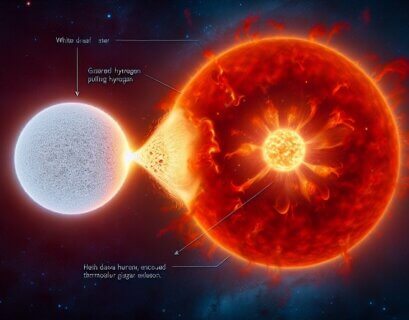Table of Contents
ToggleThe Fundamentals of Quantum Physics
Quantum mechanics is based on several fundamental principles that govern the behavior of particles at the quantum level. One of these principles is wave-particle duality, which states that particles can exhibit both wave-like and particle-like properties. This means that particles can exist in multiple states simultaneously, known as superposition. Superposition is a key concept in quantum physics and allows for the phenomenon of entanglement. Entanglement occurs when two or more particles become correlated in such a way that the state of one particle is dependent on the state of the other, regardless of the distance between them. Another important principle in quantum physics is the concept of quantum tunneling. This phenomenon allows particles to pass through barriers that would be impossible to overcome according to classical physics. Quantum tunneling has important implications in fields such as electronics and nuclear physics.Practical Uses of Quantum Physics in Everyday Life
While quantum physics may seem abstract and theoretical, it has many practical applications in everyday life. One example is the use of lasers, which are based on the principles of quantum mechanics. Lasers are used in various fields such as telecommunications, medicine, and manufacturing. In medicine, quantum physics plays a crucial role in technologies such as magnetic resonance imaging (MRI) and positron emission tomography (PET). These imaging techniques rely on the principles of quantum mechanics to produce detailed images of the human body. Quantum physics also has important applications in cryptography and telecommunications. Quantum cryptography uses the principles of quantum mechanics to ensure secure communication by encoding information in quantum states. This technology has the potential to revolutionize data security and protect against cyber threats.Quantum Physics Experiments at Home
You don’t need a fancy laboratory to explore the principles of quantum physics. There are several simple experiments that can be done at home to demonstrate these concepts. One experiment you can try is the double-slit experiment, which demonstrates wave-particle duality. To do this experiment, you will need a laser pointer, a piece of cardboard with two slits cut into it, and a screen to observe the pattern. Shine the laser through the slits and observe the interference pattern that is formed on the screen. This experiment shows that light behaves as both a wave and a particle. Another experiment you can try is the Schrödinger’s cat thought experiment. This experiment demonstrates the concept of superposition. To do this experiment, you will need a box, a toy cat, and a radioactive source. Place the cat and the radioactive source in the box and close it. According to quantum mechanics, the cat is both alive and dead until the box is opened and observed.The Future of Quantum Physics and Its Impact on Society
Quantum physics is still a rapidly evolving field, with many exciting developments on the horizon. Current research is focused on harnessing the power of quantum mechanics for practical applications such as energy, transportation, and computing. One area of research is quantum computing, which has the potential to revolutionize computing as we know it. Quantum computers use quantum bits, or qubits, which can exist in multiple states simultaneously. This allows for parallel processing and could lead to significant advancements in fields such as finance, logistics, and drug discovery. Another area of research is quantum communication, which aims to develop secure communication networks based on the principles of quantum mechanics. Quantum communication has the potential to protect against cyber threats and ensure secure transmission of sensitive information.Career Opportunities in Quantum Physics
 A career in quantum physics offers many exciting opportunities for those interested in pushing the boundaries of scientific knowledge. There are several potential career paths in this field, including research positions in academia or industry, as well as roles in technology development and consulting.
To pursue a career in quantum physics, a strong background in physics and mathematics is essential. A bachelor’s degree in physics or a related field is typically required, followed by a graduate degree in quantum physics or a specialized area of study.
Skills such as problem-solving, critical thinking, and mathematical modeling are also important for a career in quantum physics. Strong analytical and computational skills are also highly valued in this field.
A career in quantum physics offers many exciting opportunities for those interested in pushing the boundaries of scientific knowledge. There are several potential career paths in this field, including research positions in academia or industry, as well as roles in technology development and consulting.
To pursue a career in quantum physics, a strong background in physics and mathematics is essential. A bachelor’s degree in physics or a related field is typically required, followed by a graduate degree in quantum physics or a specialized area of study.
Skills such as problem-solving, critical thinking, and mathematical modeling are also important for a career in quantum physics. Strong analytical and computational skills are also highly valued in this field.
Famous Quantum Physicists and Their Contributions

Quantum Computing and Its Potential Applications
Quantum computing is an emerging field that has the potential to revolutionize computing as we know it. Unlike classical computers, which use bits to represent information as either a 0 or a 1, quantum computers use qubits, which can exist in multiple states simultaneously. This allows for parallel processing and could lead to significant advancements in fields such as finance, logistics, and drug discovery. For example, quantum computers could be used to optimize complex financial portfolios or solve complex optimization problems in logistics. In drug discovery, quantum computers could be used to simulate the behavior of molecules and predict their interactions with drugs. This could greatly accelerate the drug discovery process and lead to the development of more effective treatments for diseases.The Role of Quantum Physics in Understanding the Universe
Quantum physics plays a crucial role in our understanding of the universe and the behavior of particles. It has important implications for theories such as the Big Bang and dark matter. The Big Bang theory, which describes the origin and evolution of the universe, is based on the principles of quantum mechanics. According to this theory, the universe began as a singularity, a point of infinite density and temperature. Quantum mechanics allows us to understand how particles and energy behave in these extreme conditions. Dark matter, which is believed to make up a significant portion of the universe, is another area where quantum physics is important. Dark matter does not interact with light or other forms of electromagnetic radiation, making it difficult to detect. Quantum mechanics provides a framework for understanding the behavior of dark matter particles and their interactions with other particles. In conclusion, quantum physics is a fascinating field that has revolutionized our understanding of the universe. It has practical applications in various fields such as technology, medicine, and cryptography. The future of quantum physics holds many exciting possibilities, from quantum computing to secure communication networks. Continued research and development in this field are crucial for advancing our understanding of the universe and unlocking its potential for technological advancements. If you’re a young mind fascinated by the Beginner’s Guide to Quantum Physics, you might also be interested in sharpening your math skills to unlock your potential as a statistician. In this related article, “Sharpen Your Math Skills to Unlock Your Potential as a Statistician,” you’ll discover how mastering mathematical concepts can open doors to a rewarding career in statistics. Check out the article here and embark on a journey of numerical exploration!FAQs
What is quantum physics?
Quantum physics is a branch of physics that studies the behavior of matter and energy at the smallest scales, such as atoms and subatomic particles.Why is quantum physics important?
Quantum physics helps us understand the fundamental nature of the universe and has led to many technological advancements, such as computers and lasers.What are some key concepts in quantum physics?
Some key concepts in quantum physics include wave-particle duality, superposition, entanglement, and uncertainty.What is wave-particle duality?
Wave-particle duality is the idea that particles, such as electrons, can exhibit both wave-like and particle-like behavior depending on how they are observed.What is superposition?
Superposition is the idea that a particle can exist in multiple states at the same time until it is observed or measured.What is entanglement?
Entanglement is the idea that two particles can become connected in such a way that the state of one particle affects the state of the other, even if they are separated by large distances.What is uncertainty?
Uncertainty is the idea that it is impossible to know both the position and momentum of a particle with complete accuracy at the same time.Is quantum physics difficult to understand?
Quantum physics can be challenging to understand because it often goes against our everyday experiences and intuition. However, with patience and practice, anyone can learn the basics of quantum physics.Author
-

Until 2023, Dr. Charudatta S Pathak held multiple academic positions, including lecturer, assistant professor, professor, dean, principal, director, and vice chancellor at public and private universities across India. From 2008 to 2010, he held the position of project lead in the CAE department at a European multinational corporation. Throughout his 28-year professional experience, he observed a requirement for reliable publications aimed at youngsters in grades 8 to 12, specifically for early-stage career planning. He initiated the establishment of ENTECH Digital Magazine, a complimentary periodical released on a monthly basis, accessible via entechonline.com and magzter.com. Teenagers with a keen interest in Science, Technology, Engineering, and Mathematics (STEM) and aspiring to pursue professional paths in these domains can consider reading ENTECH Digital Magazine.
View all postsRecent Posts









